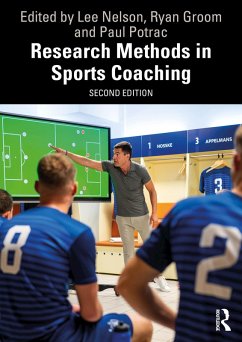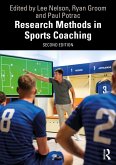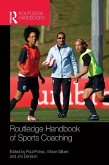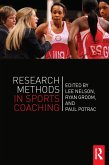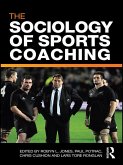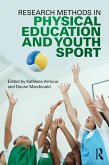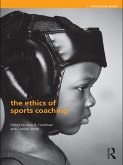Research Methods in Sports Coaching (eBook, PDF)
Redaktion: Nelson, Lee; Potrac, Paul; Groom, Ryan
42,95 €
42,95 €
inkl. MwSt.
Sofort per Download lieferbar

21 °P sammeln
42,95 €
Als Download kaufen

42,95 €
inkl. MwSt.
Sofort per Download lieferbar

21 °P sammeln
Jetzt verschenken
Alle Infos zum eBook verschenken
42,95 €
inkl. MwSt.
Sofort per Download lieferbar
Alle Infos zum eBook verschenken

21 °P sammeln
Research Methods in Sports Coaching (eBook, PDF)
Redaktion: Nelson, Lee; Potrac, Paul; Groom, Ryan
- Format: PDF
- Merkliste
- Auf die Merkliste
- Bewerten Bewerten
- Teilen
- Produkt teilen
- Produkterinnerung
- Produkterinnerung

Bitte loggen Sie sich zunächst in Ihr Kundenkonto ein oder registrieren Sie sich bei
bücher.de, um das eBook-Abo tolino select nutzen zu können.
Hier können Sie sich einloggen
Hier können Sie sich einloggen
Sie sind bereits eingeloggt. Klicken Sie auf 2. tolino select Abo, um fortzufahren.

Bitte loggen Sie sich zunächst in Ihr Kundenkonto ein oder registrieren Sie sich bei bücher.de, um das eBook-Abo tolino select nutzen zu können.
Research Methods in Sports Coaching is a key resource for students and scholars completing research into sports coaching. This revised edition places emphasis on introducing the diverse research paradigms, research designs, as well as methods of data collection and analysis available to researchers.
- Geräte: PC
- mit Kopierschutz
- eBook Hilfe
Andere Kunden interessierten sich auch für
![Research Methods in Sports Coaching (eBook, ePUB) Research Methods in Sports Coaching (eBook, ePUB)]() Research Methods in Sports Coaching (eBook, ePUB)42,95 €
Research Methods in Sports Coaching (eBook, ePUB)42,95 €![Routledge Handbook of Sports Coaching (eBook, PDF) Routledge Handbook of Sports Coaching (eBook, PDF)]() Routledge Handbook of Sports Coaching (eBook, PDF)52,95 €
Routledge Handbook of Sports Coaching (eBook, PDF)52,95 €![Research Methods in Sports Coaching (eBook, PDF) Research Methods in Sports Coaching (eBook, PDF)]() Research Methods in Sports Coaching (eBook, PDF)57,95 €
Research Methods in Sports Coaching (eBook, PDF)57,95 €![The Sociology of Sports Coaching (eBook, PDF) The Sociology of Sports Coaching (eBook, PDF)]() The Sociology of Sports Coaching (eBook, PDF)48,95 €
The Sociology of Sports Coaching (eBook, PDF)48,95 €![Research Methods in Physical Education and Youth Sport (eBook, PDF) Research Methods in Physical Education and Youth Sport (eBook, PDF)]() Research Methods in Physical Education and Youth Sport (eBook, PDF)52,95 €
Research Methods in Physical Education and Youth Sport (eBook, PDF)52,95 €![The Ethics of Sports Coaching (eBook, PDF) The Ethics of Sports Coaching (eBook, PDF)]() The Ethics of Sports Coaching (eBook, PDF)65,95 €
The Ethics of Sports Coaching (eBook, PDF)65,95 €![Lifelong Engagement in Sport and Physical Activity (eBook, PDF) Lifelong Engagement in Sport and Physical Activity (eBook, PDF)]() Lifelong Engagement in Sport and Physical Activity (eBook, PDF)59,95 €
Lifelong Engagement in Sport and Physical Activity (eBook, PDF)59,95 €-
-
-
Research Methods in Sports Coaching is a key resource for students and scholars completing research into sports coaching. This revised edition places emphasis on introducing the diverse research paradigms, research designs, as well as methods of data collection and analysis available to researchers.
Dieser Download kann aus rechtlichen Gründen nur mit Rechnungsadresse in A, B, BG, CY, CZ, D, DK, EW, E, FIN, F, GR, HR, H, IRL, I, LT, L, LR, M, NL, PL, P, R, S, SLO, SK ausgeliefert werden.
Produktdetails
- Produktdetails
- Verlag: Taylor & Francis eBooks
- Seitenzahl: 273
- Erscheinungstermin: 23. Januar 2025
- Englisch
- ISBN-13: 9781040266403
- Artikelnr.: 72309710
- Verlag: Taylor & Francis eBooks
- Seitenzahl: 273
- Erscheinungstermin: 23. Januar 2025
- Englisch
- ISBN-13: 9781040266403
- Artikelnr.: 72309710
- Herstellerkennzeichnung Die Herstellerinformationen sind derzeit nicht verfügbar.
Lee Nelson is a Reader in sports coaching in the Department of Sport and Physical Activity at Edge Hill University, UK. He leads the department's Practice in Coaching and Teaching Research Group. His research focuses on developing a critical social analysis of sports work in community and performance coaching as well as professional education contexts. He principally utilises qualitative research methods as well as dramaturgical and interactionist theoretical frameworks to understand how sports workers experience and navigate organisational life. Ryan Groom is a Senior Lecturer in the College of Exercise Sciences at the University of Derby, UK. His work is based at the intersection of interactional sociology and psychology, predominately working within interpretive applied naturalistic and ethnographic frameworks within elite sport. He has published widely in journals examining video-based feedback, organisational change, mentoring, and learning. He has also co-edited Research Methods in Sports Coaching (2014, Routledge) and Learning in Sports Coaching (2016, Routledge). Paul Potrac is a Professor of sports coaching in the Department of Sport, Exercise Rehabilitation at the University of Northumbria at Newcastle, UK. He combines qualitative research methods and dramaturgical and symbolic interactionist theorising to critically examine the interactive, relational, and emotional dimensions of group life in high-performance and community sport contexts. He holds visiting professor positions at University College Dublin and Cardiff Metropolitan University.
Introduction. Part I: Preparing and initiating the coaching research
process. 1. Navigating the research process. 2. Reviewing the literature
and formulating topics. 3. Ethical considerations. 4. Judging the quality
of coaching research. Part II: Philosophical considerations for coaching
research. 5. Philosophy of knowledge. 6. Logical positivism: Quantitative
measurement in the study of coaching behaviours, their effects on athletes,
and their modification. 7. Interpretivism: Exploring meaning making,
intentional action, and group life in coaching research. 8. Critical
theory: Social justice approaches to coaching research and practice. 9.
Critical realism: Explaining causal mechanisms that underpin events,
entities, and (inter)actions in coaching. 10. Poststructuralism:
Poststructuralist approaches to sports coaching research. Part III:
Coaching research designs. 11. Experimental designs. 12. Case studies. 13.
Ethnography. 14. Autoethnography. 15. Phenomenology. 16. Mixed methods
research. 17. Action research. Part IV: Methods of collecting coaching
data. 18. Systematic observation. 19. Participant observation. 20. Surveys
and questionnaires. 21. Individual and focus group interviews. 22. Using
documents. Part V: Analysing coaching data. 23. Analysis of quantitative
data. 24. Doing qualitative data analysis.
process. 1. Navigating the research process. 2. Reviewing the literature
and formulating topics. 3. Ethical considerations. 4. Judging the quality
of coaching research. Part II: Philosophical considerations for coaching
research. 5. Philosophy of knowledge. 6. Logical positivism: Quantitative
measurement in the study of coaching behaviours, their effects on athletes,
and their modification. 7. Interpretivism: Exploring meaning making,
intentional action, and group life in coaching research. 8. Critical
theory: Social justice approaches to coaching research and practice. 9.
Critical realism: Explaining causal mechanisms that underpin events,
entities, and (inter)actions in coaching. 10. Poststructuralism:
Poststructuralist approaches to sports coaching research. Part III:
Coaching research designs. 11. Experimental designs. 12. Case studies. 13.
Ethnography. 14. Autoethnography. 15. Phenomenology. 16. Mixed methods
research. 17. Action research. Part IV: Methods of collecting coaching
data. 18. Systematic observation. 19. Participant observation. 20. Surveys
and questionnaires. 21. Individual and focus group interviews. 22. Using
documents. Part V: Analysing coaching data. 23. Analysis of quantitative
data. 24. Doing qualitative data analysis.
Introduction. Part I: Preparing and initiating the coaching research
process. 1. Navigating the research process. 2. Reviewing the literature
and formulating topics. 3. Ethical considerations. 4. Judging the quality
of coaching research. Part II: Philosophical considerations for coaching
research. 5. Philosophy of knowledge. 6. Logical positivism: Quantitative
measurement in the study of coaching behaviours, their effects on athletes,
and their modification. 7. Interpretivism: Exploring meaning making,
intentional action, and group life in coaching research. 8. Critical
theory: Social justice approaches to coaching research and practice. 9.
Critical realism: Explaining causal mechanisms that underpin events,
entities, and (inter)actions in coaching. 10. Poststructuralism:
Poststructuralist approaches to sports coaching research. Part III:
Coaching research designs. 11. Experimental designs. 12. Case studies. 13.
Ethnography. 14. Autoethnography. 15. Phenomenology. 16. Mixed methods
research. 17. Action research. Part IV: Methods of collecting coaching
data. 18. Systematic observation. 19. Participant observation. 20. Surveys
and questionnaires. 21. Individual and focus group interviews. 22. Using
documents. Part V: Analysing coaching data. 23. Analysis of quantitative
data. 24. Doing qualitative data analysis.
process. 1. Navigating the research process. 2. Reviewing the literature
and formulating topics. 3. Ethical considerations. 4. Judging the quality
of coaching research. Part II: Philosophical considerations for coaching
research. 5. Philosophy of knowledge. 6. Logical positivism: Quantitative
measurement in the study of coaching behaviours, their effects on athletes,
and their modification. 7. Interpretivism: Exploring meaning making,
intentional action, and group life in coaching research. 8. Critical
theory: Social justice approaches to coaching research and practice. 9.
Critical realism: Explaining causal mechanisms that underpin events,
entities, and (inter)actions in coaching. 10. Poststructuralism:
Poststructuralist approaches to sports coaching research. Part III:
Coaching research designs. 11. Experimental designs. 12. Case studies. 13.
Ethnography. 14. Autoethnography. 15. Phenomenology. 16. Mixed methods
research. 17. Action research. Part IV: Methods of collecting coaching
data. 18. Systematic observation. 19. Participant observation. 20. Surveys
and questionnaires. 21. Individual and focus group interviews. 22. Using
documents. Part V: Analysing coaching data. 23. Analysis of quantitative
data. 24. Doing qualitative data analysis.
